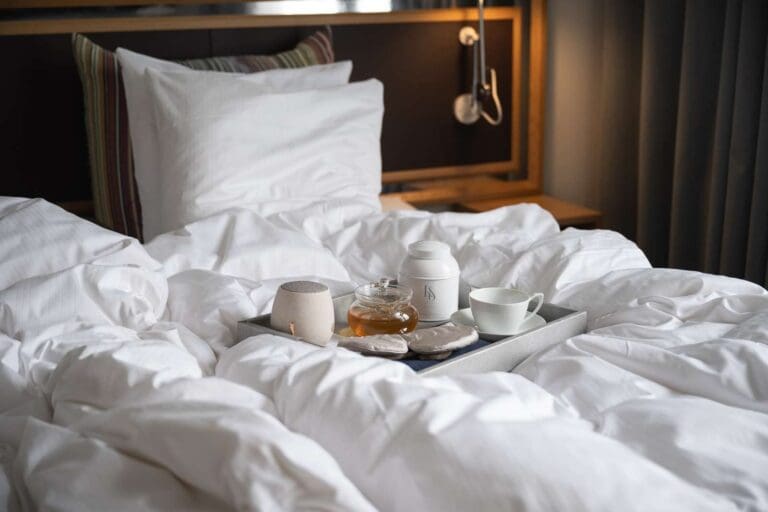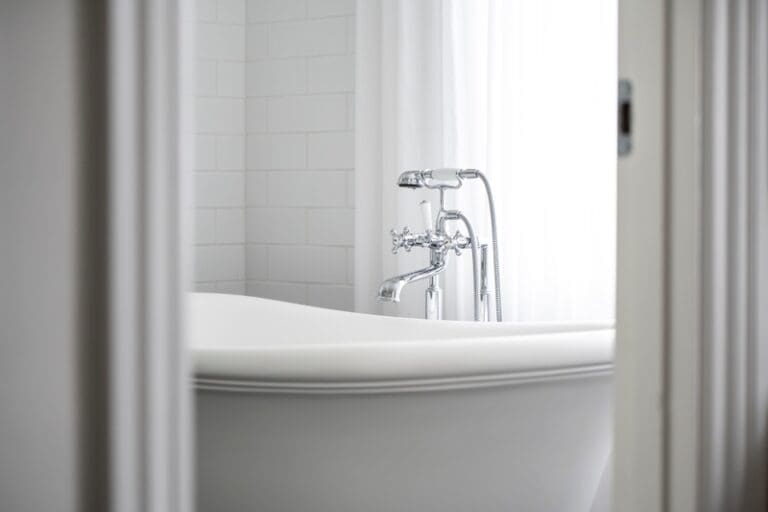How do you fall asleep faster? 10 Tips to fall asleep
At Kurhotel Skodsborg we know that a good night’s sleep is essential for a well-balanced life. Many people experience occasional sleep challenges, and for some this can become an ongoing problem. This can include difficulty falling asleep or waking up at night and having trouble getting back to sleep.
An uninterrupted sleep cycle is essential and sleep deprivation can affect your wellbeing and everyday life. Stress, worries about work and thoughts about your personal life can often result in restless nights.
If you experience this from time to time, don’t worry. But persistent sleep problems can have a significant effect on your health. It is therefore important to be aware of both the quality and quantity of sleep.
At Kurhotel Skodsborg we want to promote your sleep quality. We therefore present a number of methods and approaches that can help you improve your sleep and reach your optimal sleep potential. Read on and see how even small adjustments to your sleep habits can make a significant difference.
We have put together a special and tailor-made Sleep Retreat for those who want to improve their sleep habits. The retreat is put together by experts in sleep, diet, relaxation and wellness and gives you concrete tools and knowledge about sleep optimization with a professional sleep coach. The exclusive 2-day retreat includes a sleep workshop, meditative yoga, guided spa experiences, Forest Bathing, a sleep-optimized dinner and much more to start your journey towards better sleep.

10 tips for a good night’s sleep
1. Find the root causes of sleep problems
Trouble sleeping can be caused by many things, including worry, inappropriate sleep habits, physical discomfort and stress. It’s important to identify the causes in order to effectively address them. A thorough evaluation of your sleep habits and daily routines can be the first step towards better sleep. Among other things, you can keep a sleep diary of when you go to bed and get up – and how many times you’ve been awake/up during the night. This information can be an important first step in analyzing and improving your sleep.
2. How can your bedroom promote better sleep?
The optimal bedroom should be dark, quiet and cool. Invest in good blackout curtains that effectively block out light and a quality mattress that is comfortable for your body. In general, make sure your bedroom is set up to be a quiet place and minimize distractions such as electronic devices that can have a negative effect on your sleep quality. If you have a clock radio with a visible display, it can be a stress factor if you constantly see what time it is when you wake up – so turn the display away so you can’t see it.
3. What can you do before bed to fall asleep faster?
Creating an evening routine that signals to your body that it’s time to sleep can be effective and help you fall asleep faster. This can include reading a book, listening to music, knitting, crocheting or drinking a cup of chamomile tea (not coffee or anything with caffeine).
4. Physical exercises can help you fall asleep
Moderate exercise, like a walk or yoga earlier in the day, can improve your sleep quality. It’s important not to do intensive exercise right before bedtime, as this can act as a stimulant and delay the sleep process. However, an evening walk of 10-15 minutes before bed can have a calming effect on the body. At our Sleep Retreat, you’ll learn yoga relaxation exercises to help your body and mind find peace.
5. Relaxing music and sounds can promote faster sleep
Soothing music or the sound of waves or rain can help you relax and fall asleep. There are many apps and devices that can play relaxing soundscapes that can be part of your evening routine. Most importantly, it should be sounds or music that you feel can help you calm down and fall asleep to.
6. Avoid stress – it affects your ability to fall asleep
Stress is one of the biggest enemies of good sleep. However, you can learn stress management techniques, which can range from physical activity and social activities to professional counseling, depending on stress levels and causes. At our Sleep Retreat, you’ll learn different techniques you can implement in your everyday life when you get home.
7. Diet and sleep quality – avoid large meals before bedtime
A light evening meal, rich in complex carbohydrates and low in heavy protein and sugar, can promote sleep. Caffeine and alcohol should be avoided at the end of the day as it can disrupt your natural sleep cycle. If you eat right before bed, your insulin levels and blood sugar will rise, which can make it harder to fall asleep. Experts typically recommend not eating after 20:00. At our Sleep Retreat , you’ll enjoy a sleep-optimized dinner and learn more about diets that can help you towards better sleep.
8. Regular sleeping patterns can counteract poor sleep
Good sleeping habits train your body and mind for when it’s time to sleep. Try introducing regular bedtimes both on weekdays and weekends. For example, set an alarm on your smartphone an hour before your bedtime to start your relaxation phase.
9. Thoughts and worries can keep you awake
Pre-bedtime thoughts can be hugely disruptive. It’s therefore a good idea to get your thoughts and worries under control before you go to bed, if you can. One tip is to write down any worries and clear your mind before bedtime. Mindfulness is also a technique that can help pause distracting thoughts. At our Sleep Retreat, you’ll be introduced to a variety of sleep meditations to help you clear your mind before bedtime.
10. Avoid screens an hour before bedtime
Several studies have shown that especially the blue light from smartphones, tablets, etc. has a negative impact on the ability to fall asleep. A good habit is therefore to avoid screen time an hour before bedtime.
To-do list: Tips for falling asleep faster
- Be consistent with your bedtimes.
- Only use your bed for sleep.
- Avoid napping – it can disrupt your natural sleep rhythm.
- Keep the bedroom cool and dark and avoid screens.
- Do breathing exercises where you breathe through your mouth.
Important points to remember:
- Identify and analyze the causes of your sleep problems.
- Before sleep diary.
- Create a sleep-friendly environment in your bedroom – appropriate temperature, good mattress/pillow/duvet and good blackout curtains.
- Establish a calming evening routine and avoid screens 1 hour before bedtime.
- Avoid stimulants such as coffee, alcohol and strenuous exercise before bed.
- Avoid eating after 20:00.
- Try relaxation techniques and stress management.



Sleep Retreat – A stay that starts your journey towards better sleep
At Kurhotel Skodsborg, we have developed an exclusive Sleep Retreat in collaboration with Lehman Partners. With a 2-day Sleep Retreat at Kurhotel Skodsborg, you get concrete tools and knowledge about sleep optimization with a professional sleep coach. You’ll experience a unique retreat with a sleep workshop, meditative yoga, guided spa experiences, Forest Bathing and sleep-optimized dinner. Start your journey to better sleep with a Sleep Retreat.
At Sleep Retreat you get:
- Guided spa experiences – Indulge your senses in our spa and wellness universe with our spa host.
- Sleep-optimized dinner – Delicious culinary dinner designed to promote a good night’s sleep.
- Guided meditation – Our stress and sleep coach guides you to find peace of mind.
- Meditative yoga – Learn gentle stretches that calm the body with a professional yoga instructor
- Forest Bathing – Enjoy the healing atmosphere of the forest and feel a sense of increased well-being and calm guided by a sleep coach.
- Concrete tools and knowledge about sleep optimization – with our professional sleep coach you get concrete tools that you can take home and implement in your daily life.
Read more about Sleep Retreat and book your stay

